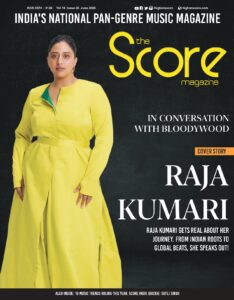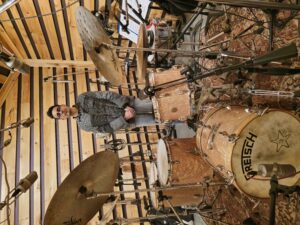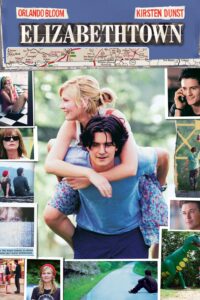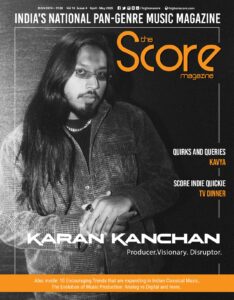It has been around six years since our last interview with The Yellow Diary, and they have turned out to be one of India’s most loved bands. Their consistency and dedication are two main reasons behind the positive effect they have on their fans. Here is the chat we had with the band.
We had our previous conversation back in 2017. What has changed since then?
Himonshu: The biggest change for us right now is that Harsh joined our band two years back. The song Mann from our latest EP is actually the first song that we have written with him. This is a big shift for us going forward. I also feel that things have changed for us on the live front. The shows have been getting bigger, and better. The audience has gotten more loving, we never thought that was possible, but the audience has gotten even more loving from what we got back in 2017.
We feel the whole reception towards independent music in the industry itself has increased a lot in the last six years, especially in the last three years.
Rajan: We as a unit have become more tighter and way more mature in terms of the way we write our music and the way we emote and express within our songs. With time in any relationship what happens is that you find freedom, in terms of understanding each other far better. So, even what you are trying to express, what you are feeling, all of that stuff gets way easier for everyone to catch on to.
This also simplifies the aspect of writing songs together because if it is easier for you to latch onto an emotion one particular person is feeling in the room, then you would be able to emote better. And when that happens, that sync gets tighter and it shows in the writing. That is something that has happened to us.
Sahil: Also, The Yellow Diary’s family has started to grow! Rajan is getting married. Himonshu is going to be a dad.
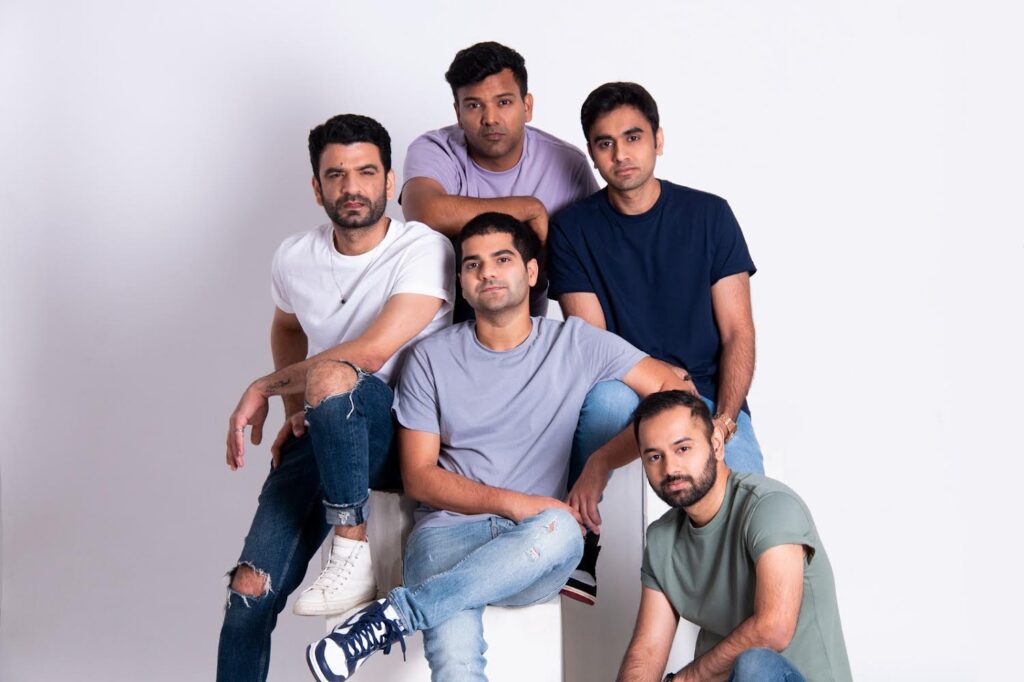
What is the dynamics of the band? Does one person come up with an idea and then you all work on it, or do you all contribute individually based on your own lives?
Rajan: To explain this I would like to paint you a metaphor. It’s like a pentagon, where each area is open to the universe and everyone can bring in their ideas out of thin air. The moment we have an idea, the basic functionality of the band is to kind of latch onto it, and try and understand it, and feel what the other person is feeling. There’s no one particular leader. The fact that we are five equal parts of the band also very loudly speaks to the fact that ideas are in everybody’s realm.
Your band emphasises a lot on the musical elements in your songs. As much as the singer sing, so does the music. How would you describe this quality?
Sahil: For us in the grand scheme of things, we are all essentially servants of the music itself. We’re not here to take centre stage. It’s not about one person. When we sit down to write the music, it’s actually a blank canvas. We try to throw all possible ideas that we can on it. See what sticks and what doesn’t stick. The music takes the lead in this.
The music we make is not a part of one person but all of our consciousness. I would play something on the drums and Rajan might say this could also sound cool as a pattern on the guitar, or the guitar riff could sound something different on the base. We are all very open-minded and it helps the cause at the same time.
Himonshu: Like he said we are always in service of the music, and music is always in service of the emotions we put out in the song. We will always do what feels right just for the emotion, and try not to prove anything more out of that.
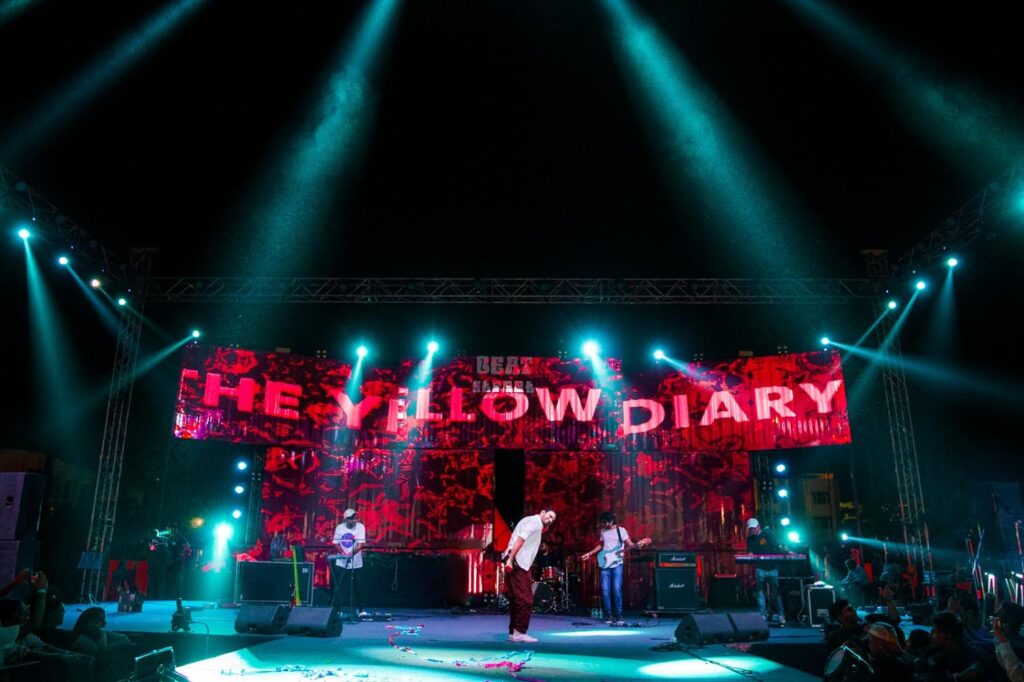
Can you tell us a little about your latest release Mann?
Rajan: Mann, the EP, has three songs. Mann, Sada, and Kaun Mera. I’ll start with Mann. Mann became the first song we wrote with Harsh, that in itself makes the song very special for all of us. It talks about the initial feeling when you fall for somebody, feeling those butterflies in your stomach. We’ve all lived that emotion at one point or another in our lives. It wasn’t too difficult to capture that.
Even with the video we wanted to emote this emotion specifically. So, from the casting, the story, to the way it has been shot, everything was based on that one particular thought. We are very happy with the way the whole product has come out, and the amount of support and love people are sharing towards us is always so appreciated.
Sada was a song we wrote back in 2016. It took about 6 years for us to think that “Yeah now we are ready to take it back to the studios and create an audio that goes out to DSPs, and people can hear it as the studio version of the song.” You can definitely call it an example of us maturing, in a sense. Certain songs take their own journey along with you, and you realize at some point in your life that “Okay, now you have the right kind of expression to make the art you want to.”
On the other hand, Kaun Mera was written for a project back in 2018. Again, if you look at the three songs it comes to our mind that it is tied by a very thin thread of emotions you live in a relationship. When you fall for somebody, when love dictates and guides you through your relationship. This is why we think the EP works well together. A relationship is about the ups and the downs and sticking together. When you are talking about the moments that are happy, you also talk about the moments that aren’t so happy, Kaun Mera is about one of those moments.
Stuart puts is really well. He says “It feels like the past, the future, and the present are coming together because a couple of songs were written back in the past” Mann is a good representation of what we sound, and will sound in the foreseeable future.
Music industry is driven by social media presence. Where do you think the balance lies between being honest about the music and it being a hit on social media?
Himonshu: I feel like the reason wemake music is entirely different. The primary reason is us five bros making music together. I feel, to a large extent making music is an extremely spiritual affair where you are channeling your ideas, emotions, and thoughts that you don’t know where they come from. When you try to muddy it with a lot of materialistic and worldly things, it affects what you finally put out.
There are different reasons to do different things, but for us, the reason we create music is to be honest with ourselves and express ourselves very freely. We don’t think about whether it will work on social media or not. Those kinds of things come into the picture once the songs are made already.
What are the best parts of recording sessions and live performances?
Sahil: One of the best parts of recording is that you can record multiple takes of the same thing. If you make a mistake there is no love lost, you can always try once again. The challenging part about being in the studio is that every detail gets captured. You take one extra breath or add one little extra note and it needs to be re-done. This is a fun challenge as it makes you really crisp in portraying your idea.
Live is more about creating the synergy between the audience and the artist. Whatever we give to the audience it comes back 10-fold to us. To be a part of that exchange is why we do what we do. We do change a few things here and there to keep things new and fresh for us but at the same time, we’ve been those artists who pay respect to what was recorded. We want to translate the same feeling that the recording has when we play live.
What motivates you to make music and who do you write it for?
Rajan: To answer that we will have to look at it from a very different perspective. It is not about writing it “for”, we write it as an expression of what we are feeling. It’s a mental release as opposed to writing “for” a certain subject. If you are trying to write it for something, then there is a particular goal that is outside the realm of your own spiritual journey. As Himonshu said, it is a very spiritual journey for us.
We express our feelings, our ideas, and we share our opinions. In return what it gives us is a lot of mental peace. When you write something in your diary, and you deep dive into that thought and you release it on a piece of paper, you feel so relaxed and relieved. That’s what music does to us. That the reason why we write the music that we do.
Himonshu: There is this joy when we finish writing the song that I have never felt from anything else in the world. When we finish writing a song together, even if it is an initial rough scratch, we feel immense happiness. Whatever fatigue you must have had, however your mood must have been it creates the biggest joy in the world. I mean, how can one compare it to anything else?
So, is it fair to say that you will never stop making music until the day you die?
Sahil: A 100%
Rajan: If we are not going to stop feelings things, and we are not going to stop experiencing life then it will be difficult to stop making music.
Himonshu: [laughs] Even if we stop feeling new things, I think we have enough memories to write songs for quite a few years.
Rajan: Even in Lockdown we didn’t stop making music. We were all stuck in different locations but one of the biggest reasons why we got through the lockdown peacefully was because of the fact that we were supporting each other through thick and thin. Roz Roz was a song that the pandemic gave us.
We were working on it through the Pandemic’s first year and then we met in 2021 to get it recorded. All the challenges that came in-between making it happen were accepted, and it was worth it because of the way the song was received the way it was. To look at the bigger picture, the pandemic did take a lot from us all, but it gave us one more reason to call each other brothers.
Harsh, you are the newest member of the band. Could you share a memory or experience of interacting with the fans?
Harsh: There are so many memories. I had been to a Yellow Diary gig before I joined the band. I am the only person from the band who has experienced their show off stage and on stage. But it was the first gig that I will never forget. To hear the crowd sing the songs with the band was unreal. To be in the audience is different, but to have the crowd sing to you is wild.
The Yellow Dairy has consistently become famous. Are you where you thought you would be back in 2017? Are there any barriers stopping you from getting bigger?
Rajan: There was a song we wrote called ‘Koh’ which means mountains. It talks about how every hundred is just another zero. Back in 2017, when Sony wanted to sign us and release some music with us, that was a hundred for that moment. Once that happened, we released some music and there were another hundred we started to follow. Now we have crossed a few hundreds and there is another hundred that we are looking forward to. That’s how we live, that’s how we want to take our journey forward.
Mathew McConaughey said in his Oscar speech, “My hero is always going to be me ten years ahead of me. I’m never going to catch it, but I’ll always have a goal to walk to.”
Is there anything you would like to convey to your fans?
Rajan: We have just released Mann EP, and we are going to be releasing a lot of other music this year. We hope you continue to love and support us the way you have. We hope to be playing for you wherever you are.
Himonshu: And we are going to have an awesome tour across the country at the end of the year.
Do Follow
Instagram – https://www.instagram.com/theyellowdiary/

